Παρουσίαση/Προβολή

Introduction to Linguistics II (Εαρ. 2025-'26) - Section Α-Καρ
(63ΓΥ03) - Άννα Πιατά
Περιγραφή Μαθήματος
Course description
The aim of this course is to familiarize students with issues pertaining to the study of linguistic meaning, in particular the semantic, pragmatic, and textual parameters that are involved in the production and understanding of language, while also considering the role of regional, social, and cultural dimensions. Drawing on semantics, pragmatics, text linguistics/discourse analysis, and sociolinguistics, we will address the key concepts that form the backbone in the study of meaning across the board.
Upon successful completion of the course students are expected to:
- acquire basic concepts pertaining to the study of linguistic meaning;
- apply such concepts to the analysis of linguistic examples;
- associate the study of language with contextual parameters (pragmatic, textual, regional, and social);
- reflect on how society and culture impact on the production and understanding of language.
Ημερομηνία δημιουργίας
Κυριακή 27 Φεβρουαρίου 2022
-
Περίγραμμα
Bibliography
Yule, George (2010). The Study of Language. 4th edition. Cambridge: Cambridge University Press. [chapters 9, 10, 11, 17, 18, and 19]
Dirven, René & Marjolijn Verspoor (2004). Cognitive Exploration of Language and Linguistics. 2nd edition. Amsterdam: John Benjamins. [extracts from chapters 2, 7, 8 and 9]
Instructional Methods
The course is offered in the form of lectures, which are uploaded on e-class together with other learning materials, including articles and book chapters, online resources, and formative coursework. Students are expected to actively participate through in-class discussions and workshop-style group work during class meetings. Classes will include take-home assignments in order to facilitate, and monitor, students’ understanding of the topics discussed in class.
Assessment Methods
Students will be assessed on the basis of an end-of-term exam.
Course Syllabus
Week 1
Introduction to the course.
The study of meaning, comprising semantic, pragmatic, textual, regional, and social dimensions.
Week 2
Semantics I.
Semantic features.
Semantic/thematic roles.
Words, meanings, and concepts.
Week 3
Semantics II.
Lexical relations.
Synonymy, antonymy. Collocations.
Week 4
Semantics III.
Homonymy vs polysemy.
Metaphor and metonymy.
Week 5
Pragmatics I.
Context.
Deixis and reference.
Presupposition.
Week 6
Pragmatics II.
Speech acts. Direct and indirect speech acts.
Week 7
Pragmatics III.
Politeness.
Face-threatening acts and politeness strategies.
Week 8
Pragmatics IV.
Conversational implicature.
The Cooperative principle and the maxims of conversation.
Week 9
Text linguistics-Discourse analysis I.
Cohesion and coherence.
Week 10
Text linguistics-Discourse analysis II.
Conversation analysis and turn-taking.
Week 11
Sociolinguistics I.
Regional variation.
The standard language. The dialect continuum.
Bilingualism and diglossia. Pidgins and creoles.
Week 12
Sociolinguistics II.
Social variation.
Social dialects, register, and slang.
Prestige. Speech accommodation.
Week 13
Wrap up class and exam preparation.
Please note that this course outline is tentative, hence subject to change.